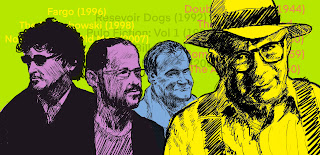 |
| Billy Wilder; Ethan and Joel Coen; and Quentin Tarantino from Vulture’s List of the The 100 Best Screenwriters of All Time |
In the Introduction to Theory of Literature, Paul Fry invited me to see literature from a variety of perspectives: from Aristotle's three part structure (beginning, middle, and end); Abrams triangulation of literary theory (Universe, Artist, and Audience forming the points around The Work); authority being taken from the author by Roland Barthes killing the author; Freud's preoccupation with Oedipus and Harold Bloom's rekindling the theme in The Anxiety of Influence: A Theory of Poetry; the evolution of feminist criticism; and the tendency for some modern literary theorists to deconstruct into dust. In short, Paul Fry's lecture had my mind reeling.
John Rogers' Milton was a welcome change of pace until Paradise Lost. That was a difficult read. It was difficult for me to stay awake during Milton's convoluted poetical construction and his biblical and mythological name dropping. What were helpful were the "Arguments" that Milton reluctantly wrote at the behest of his publisher which gives a synopsis of each book. I felt a real sense of accomplishment when I finished; too bad that a sense of accomplishment doesn't necessarily mean learning.
Finally, The Norton Introduction to Literature: the truth is I only got up to the 8th section of the 42 sections planned. Instead I decided to audit:
- Angus Fletcher's Screenwriting 101: Mastering the Art of Story (which inspired me to do the "best" screenwriters drawing)
- James Hynes's How to Write Fiction,
- Eric Rabkin's Masterpieces of the Imagination,
- Thomas Shippey's Heroes and Legends: The Most Influential Characters of Literature, and
- Marc Conner's How to Read and Understand Shakespeare.
No comments:
Post a Comment